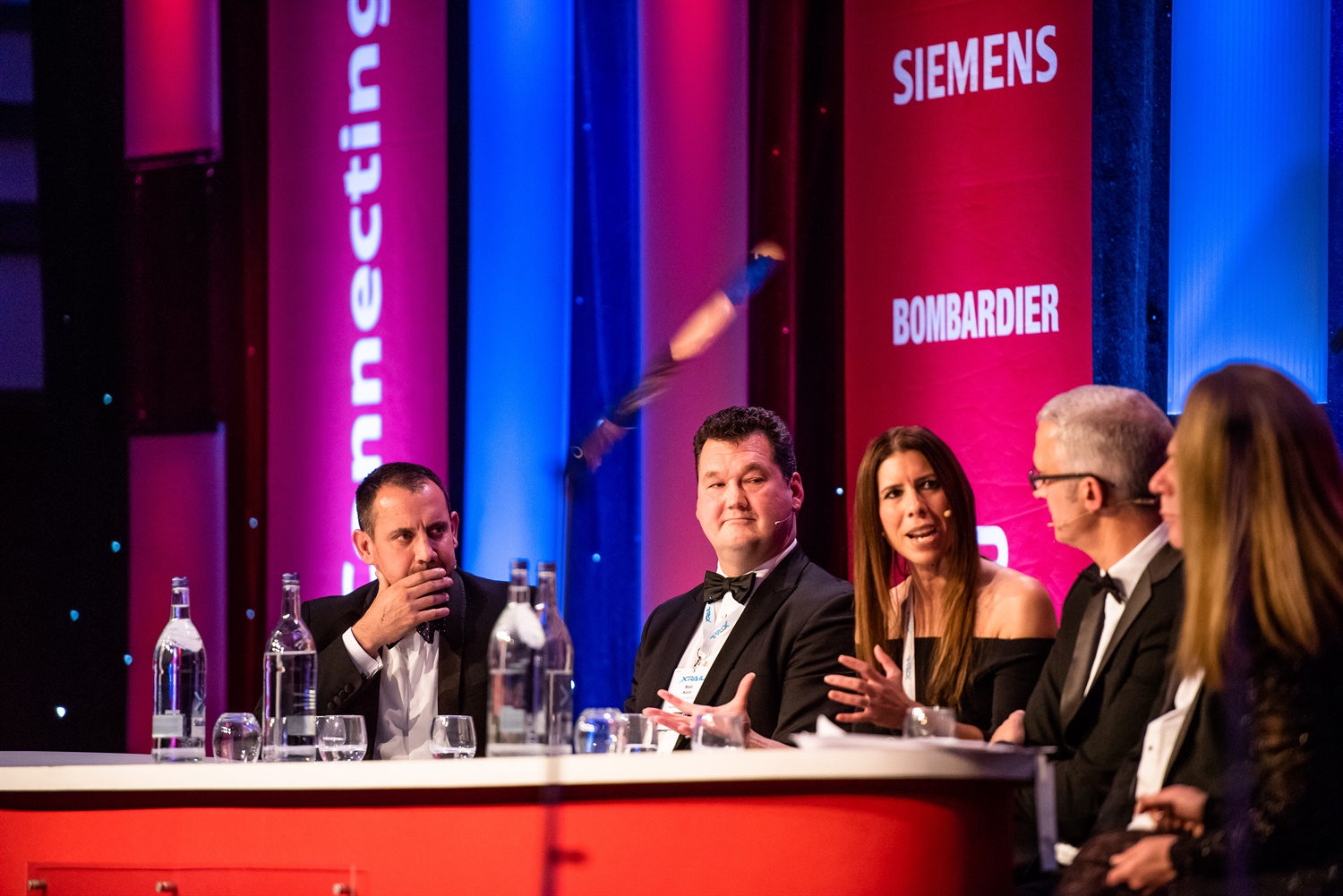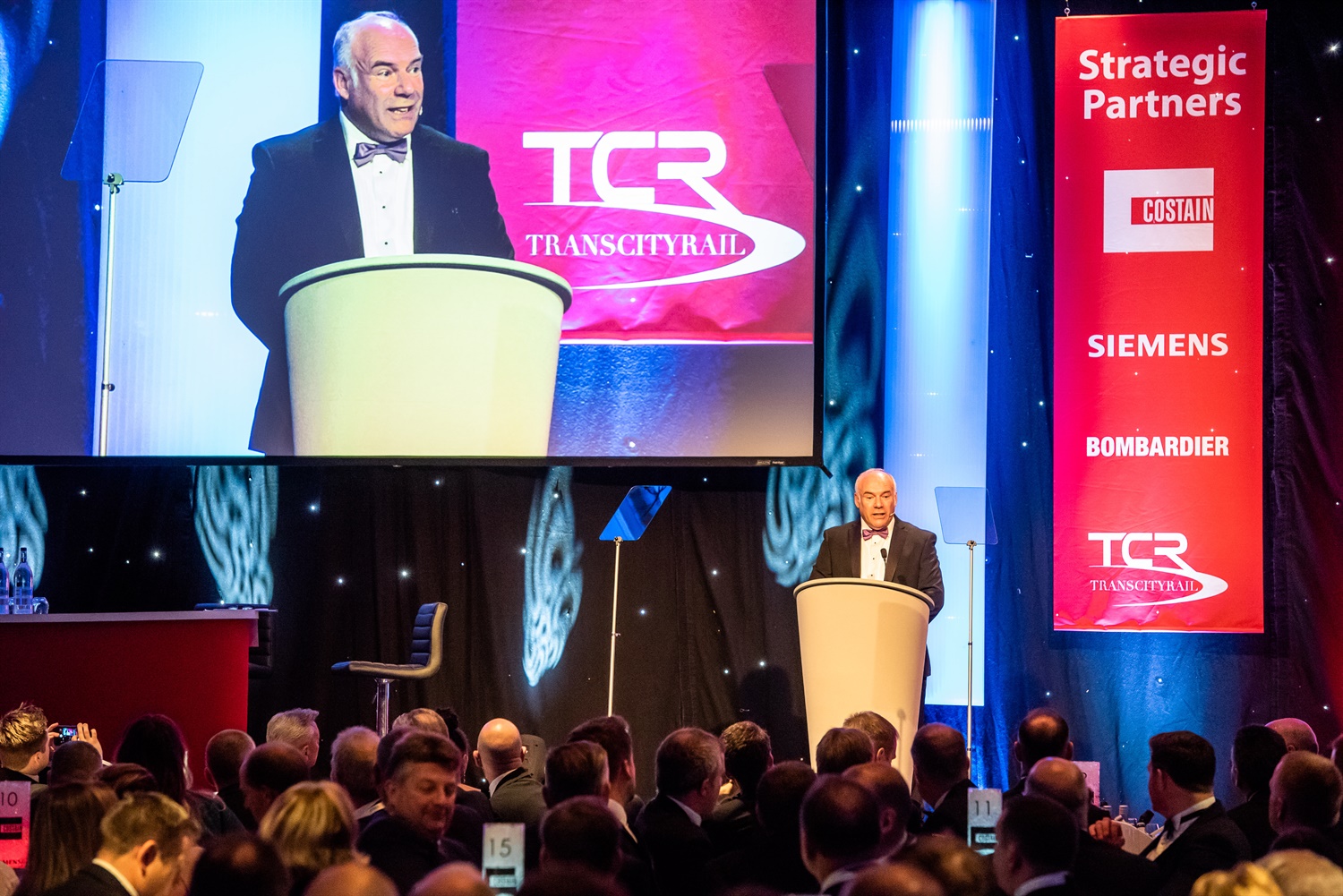09.10.18
TransCityRail 2018: Signalling the future
On Thursday, Manchester’s world-famous Principal Hotel played host to the industry’s biggest leaders, decision-makers, and (t)railblazers at the fifth iteration of TransCityRail, in a celebration of the progression of the industry in the north.
As ever, the star-studded night was an unmissable event on the calendar for those most passionate about the advancement of rail in the region. Those who attended included a wide array of businessowners and directors from across the sector, ranging from SMEs looking to collaborate and work with big players to major contractors such as Costain, BAM Nuttall, Siemens, XRAIL Group, and Bombardier – all with a devotion to giving customers a valuable and enjoyable experience when using the northern network.
Delegates were treated to Q&A sessions throughout the morning, afternoon, and evening discussions, where members of the industry were able to debate hot topics and key upcoming plans for rail in the north. For the first time, the discussion was hosted eloquently and expertly by BBC presenter and veteran journalist Helen Fospero.
Not only did TCR welcome a variety of different sectors in transport, the event brought together speakers and exhibitors from different backgrounds and walks of life. In addition to the plethora of women and those from minority backgrounds attending the event, the first-ever Q&A panel entirely dedicated to equality, diversity, and inclusion (EDI) was comprised of head of EDI at HS2 Mark Lomas; head of EDI at VolkerWessels UK Hollie Woodard; Kris Phelps, member engagement manager at the Employers Network for Equality & Inclusion; membership development & international trade director at the Rail Alliance Lucy Prior MBE; and recurring guest Anna Delvecchio, who works as commercial account director at Amey and is the co-lead of the RSG sector deal.
TransCityRail’s focus on recruiting diverse talent and backgrounds to the rail industry was a staple of discussion throughout the event.
Read all of the key happenings from the event on RTM! Here are TransCityRail’s Top 10 Tweets; Role models need to promote rail careers “in an incredibly different way”; The north needs to move to “front of the queue” for transport investment, says Andy Burnham.
The daytime conference
Head of Northern Powerhouse Rail (NPR) Development at Transport for the North (TfN), Steve Sutcliffe, kicked off the day’s proceedings, outlining the clear benefits of prolonged and consistent investment in transport infrastructure in the region. He argued that a transformed north has a huge prize on offer: 850,000 more jobs and a £100bn GVA boost for the region.
The first Q&A panel discussion of the day focused on working with tier 1s and consultancies. Members of the audience were able to query and question directors at industry-leading companies Mott MacDonald, MACE, Costain, and Arup on how smaller businesses can develop fruitful relationships with the larger players or even break into the market for the first time.

The discussion continued further when head of UK services for Bombardier, Tim Bentley, was next on and echoed the previous group’s comments, claiming that Bombardier’s presence and readiness to partner with companies in the north will be essential to attendees at the event. The two separate talks highlighted the value of collaboration of SMEs and larger businesses in the north, and how TCR brings the two together.
The rest of the morning session was jam-packed with enlightening and informative discussion. After Nexus transport strategy director Philip Meikle’s impassioned speech of his experiences through life using the Metro in the Tyneside and the schemes on the horizon, one of the key speakers at the event, Greater Manchester mayor Andy Burnham, took to the stage to talk about the sheer importance of events like TCR during times of big decisions for northern transport.
Speaking exclusively to RTM afterwards, Burnham said the north of England is “on the cusp” of major decisions that will determine the future of the region’s economy. He added: “By coming here to the centre of Manchester, those big international companies will see the potential of the northern economy. It’s there: you can see the cranes on our skyline. This is growth that is happening, and it’s happening now.”
After the lunch and networking break, attendees were treated to a double helping of digital rail discussion: TfN’s integrated smart travel programme director Alastair Richards, and Stuart Calvert, director of programme technical services and supply chain, at Group Digital Railway, were the two opening speakers for the afternoon session.
The assortment of guest speakers continued through the afternoon, delivering talks to delegates about the status and plans of current and future endeavours. HS2’s Phase 2 managing director Paul Griffiths, who will be leaving the role at the end of the year and delivered one of his last speeches in the role at the event, pitched the multibillion-pound company’s case for its impact in the north already: over 90 companies based in the north-west alone have already delivered work to help HS2, with tens of thousands of contracts to follow. Economic potentials such as this highlight how attending TCR can help your business collaborate and work with HS2 on future projects, and develop a high-speed rail network that will benefit millions of people.
Open for Business programme director at Network Rail, David Ollerhead, perfectly rounded off discussions for the daytime session with an invitation to third-party investment into the railway. Ollerhead argued that working closely with the local community is “absolutely key” in driving progress.

The black-tie dinner
Following Helen Fospero’s closing remarks at the conference, the main hall at the Principal was transformed into a stunning dinner space ready to welcome 500 attendees for the evening.
Tim Wood, NPR director at TfN, gave a rousing keynote speech that emphasised the need to take advantage of the opportunity put before the north. Despite recent news that major projects such as Crossrail and HS2 had encountered serious delays and soaring costs, this was not the case for NPR, said Wood.
“We’ve got our support from the major political parties. We’re delivering a first-class business plan on time and on budget. Costs can be controlled, and investments realised. By 2024 we’ll be putting a spade in the ground,” he added. Concerns that Northern Powerhouse could become a money-pit with no end in sight may have been cleared by one of the leading lights behind the project, then.

Wood later joined an illustrious panel of industry experts to field questions from the audience about a range of topics. Panellists included Network Rail’s Patrick Cawley, Amey’s Anna Delvecchio, HS2’s Paul Griffiths, director of policy and strategy of the West Yorkshire Combined Authority Liz Hunter, programme director at Costain Julian Dunn, and Matt Kent, director of operations at Siemens.
The final panel encapsulated the spirit of TCR as a whole: under the same roof, you have public sector leaders, politicians, heavyweights from the private sector, and central government all working together in tandem for a brighter future for transport in the north.
Missed out on TransCityRail 2018 but want to attend next year? Click here to find out more and get your ticket for 3 October 2019!
Enjoying RTM? Subscribe here to receive our weekly news updates or click here to receive a copy of the magazine!